★★★½
“Sometimes I feel like this has been my whole life.”
 We’d skipped the last two installments at the movies, having been burned by part three, but after the excellent content of #5, and since this was likely to be our last chance, Chris and I made it a “dinner and a movie” thing on Saturday. Was disturbed by how many kids there were for this R-rated film – hell, even a couple of babes in arms, whom I’m sure loved the non-stop violence. I guess it was deemed kid-friendly by their parents, with this one getting its MPAA rating just “for sequences of violence throughout,” rather than anything truly corrupting, such as momentary Milla mammarage. Cutely, the feature was preceded by a quick personal message from director and star, thanking us for their support of the series. Yeah, it’s utterly meaningless, but nice to be appreciated.
We’d skipped the last two installments at the movies, having been burned by part three, but after the excellent content of #5, and since this was likely to be our last chance, Chris and I made it a “dinner and a movie” thing on Saturday. Was disturbed by how many kids there were for this R-rated film – hell, even a couple of babes in arms, whom I’m sure loved the non-stop violence. I guess it was deemed kid-friendly by their parents, with this one getting its MPAA rating just “for sequences of violence throughout,” rather than anything truly corrupting, such as momentary Milla mammarage. Cutely, the feature was preceded by a quick personal message from director and star, thanking us for their support of the series. Yeah, it’s utterly meaningless, but nice to be appreciated.
Onto the movie, which I think probably would have been better received by us as a stand-alone entry, if we hadn’t watched parts 1-5 last weekend. #QuickPlug: re-reviews of all those to follow later this week. For there seems to be an awful lot of ret-conning going on, in particular for the Red Queen, played here by Milla’s daugher, Ever. Not only is her origin story drastically revised from Apocalypse, there’s also a new, Robocop-esque rule that she can’t harm Umbrella employees. [I note that Anderson even lifts the same escape clause used by Verhoeven] Must be Red Queen v1.1, because all the workers at the Hive she killed in the original movie, didn’t seem to benefit from this protection…
The story sees Alice (Jovovich) returning to Raccoon City, seeking the airborne antidote she discovers – from of all people, the Red Queen, little Miss Laser Corridor herself – was created by Umbrella. If Alice can release it into the wild, it will take out all the T-virus infected. Which is a bit of a problem since, don’t forget, the list includes our heroine herself. Standing in her way is Dr. Isaacs (Glen), who has set his plan in motion to exterminate the last remaining pockets of humanity and complete his apocalyptic vision thing, along with a massive swarm of zombies he’s leading back to the Hive. On Alice’s side are a few of those final survivors, including Claire Redfield (Larter) and Abigail (Rose), adding extra girls-with-guns firepower – as if it were really necessary here.
The main problem is this: editor Doobie White really should lay off the caffeine. I don’t think it’s Anderson’s problem, as Retribution was perfectly fine in this area, but the hand-to-hand fights look like they were edited by putting them through a highly enthusiastic wood-chipper. They stay just about on this side of incoherent, but you don’t so much watch these, as experience them on a subliminal level. Maybe it’s a result of protagonists Jovovich and Glen being in their forties and mid-50’s respectively: I know if I was appearing in an action movie, you’d certainly have to edit the hell out of me to look good! But it’s still annoying as hell. The best sequence is when the camera sits back a bit and we can actually appreciate Alice, dangling from an underpass, as she beats up a posse of hapless Umbrella drones (below).
Due to this, the film is at is most effective in other areas, mostly when going wide and giving us a look at the bigger picture, specifically the sheer scope of the devastation and conflict. There’s a couple of scenes where I think the zombie count may have surpassed World War Z, and that volume is undeniably impressive. It requires, naturally, equally large-scale defense and the sequence where the humans create multiple waterfalls of fire is startling and striking. An an aside, I note the film cost only $40 million, which is $25m less than last time, and little more than the price-tag for the original, 15 years ago. Anderson is clearly great at getting bang per buck, and if the box-office reception was lukewarm in North America, the film has already almost made its cost back in Japan alone.
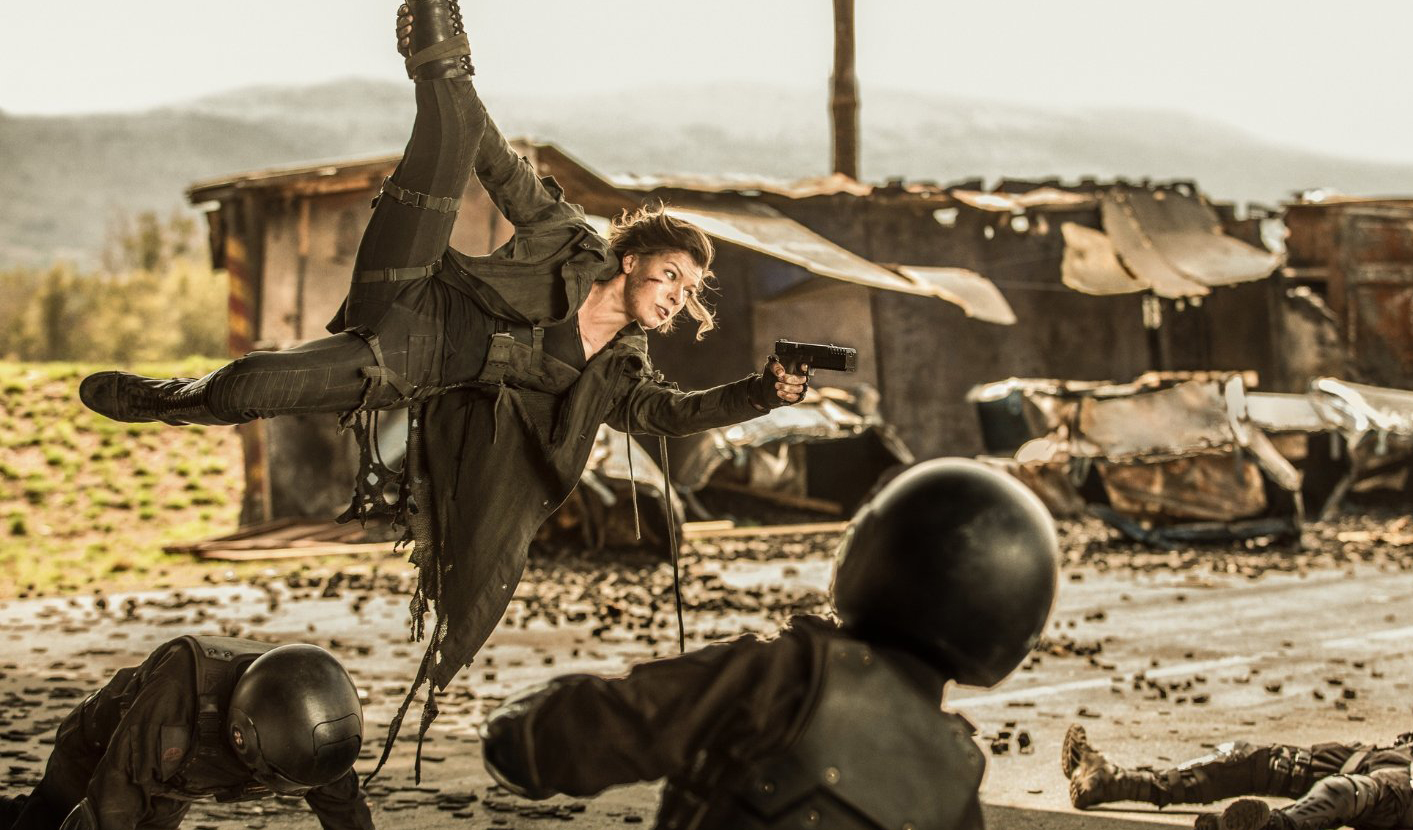
I also was glad to see Glen back, and just as in #3, he brings a human face to the evil corporation. [Yes, he died at the end of that one. No, it’s not a problem.] I envisage a long career for him, in the mode of Charles Dance and Alan Rickman, being the go-to guy whenever a film needs a solidly British villain. Here, he gets to show a couple of facets, both coldly calculating and manically psychotic, and is fun to watch in both. But, of course, it’s Milla’s show, and she also gets to do a bit more than you might expect: if you ever wondered what she’ll look like in her seventies, this movie will answer your question. Though going by how little she seems to have changed over the decade and a half of the series, if she looked exactly the same at that age, I wouldn’t be surprised.
Otherwise, she has become Alice, adopting a world-weary stare here, reminiscent of our cat when we annoy him. It seems to say, “I could get violent, but you’re just not worth the effort,” while she re-enacts some of the series’s greatest hits, such as the laser corridor, or a whole pack of zombie dogs (well, more dog-shaped things, to be honest). Is there closure for Alice? Yes, although not as much as I would have liked. The film had a chance to draw a line under itself in permanent marker, and allow Milla to go off into the happy suburban life her character briefly enjoyed in #5. Sadly, the script doesn’t quite have the courage to do that; let’s just say, if Mr. and Mrs. Anderson need an extra wing on the mansion the franchise’s profits has bought them, it won’t be impossible.
All told, if you’ve got this far in the series, you’re not likely to be disappointed, except by the over-active editing. If you haven’t, this is certainly not going to convince you of its merits. And that’s okay too.
Dir: Paul W.S. Anderson
Star: Milla Jovovich, Ian Glen, Ali Larter, Ruby Rose






















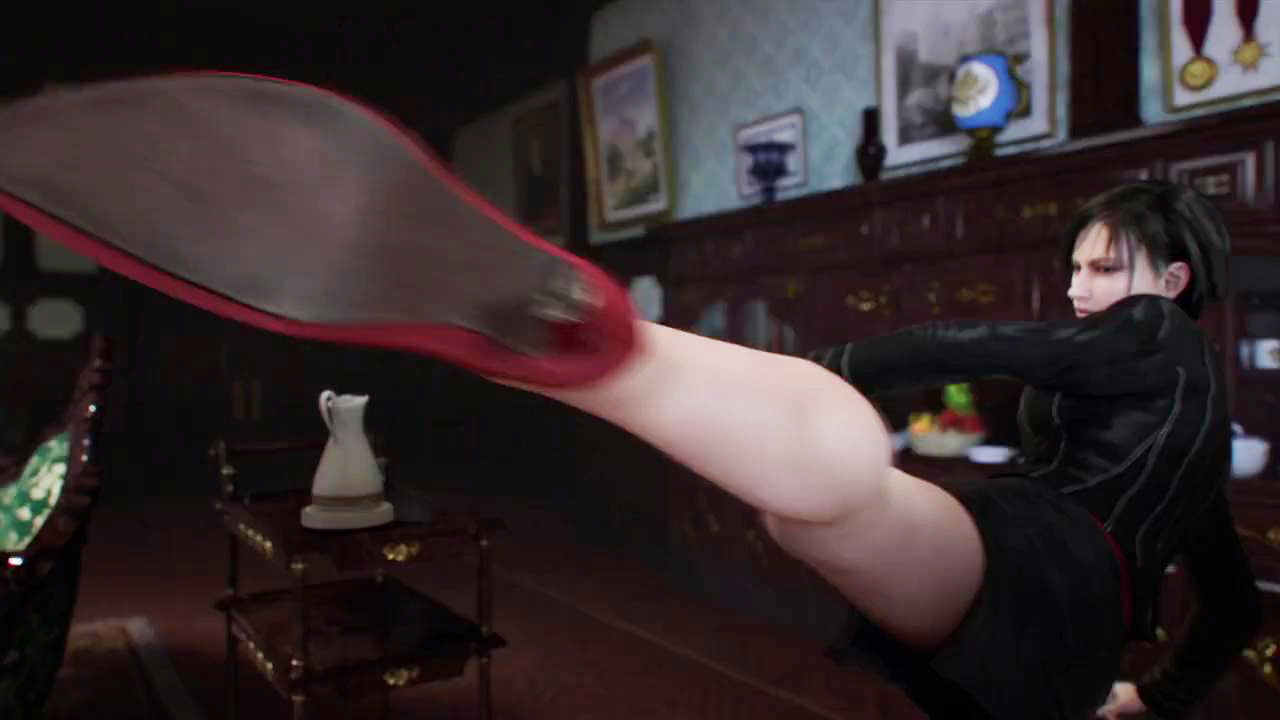 The Milla Jovovich series are not the only films set in the Resident Evil universe. There have also been two feature-length computer animated movies: Degeneration was released in 2008, and Damnation four years later. A third, Vendetta, is scheduled to be released in Japan this spring. While made in Japan, with a Japanese director and crew, the voice cast are English-speaking. As with the novels, the stories and characters are in line with the universe of the computer games, rather than the live-action features, and tend to occupy spots in the timeline between the entries in the game series. Therefore, there’s no Alice, but the animated films contain their fair share of strong heroines and, of course, action.
The Milla Jovovich series are not the only films set in the Resident Evil universe. There have also been two feature-length computer animated movies: Degeneration was released in 2008, and Damnation four years later. A third, Vendetta, is scheduled to be released in Japan this spring. While made in Japan, with a Japanese director and crew, the voice cast are English-speaking. As with the novels, the stories and characters are in line with the universe of the computer games, rather than the live-action features, and tend to occupy spots in the timeline between the entries in the game series. Therefore, there’s no Alice, but the animated films contain their fair share of strong heroines and, of course, action. There’s a new EvilCorp in town, and its name is WilPharma, as we learn during the montage of news stories which opens this. In game terms, the film takes place after the events of “Resident Evil 4”, which saw the dismantling of the Umbrella Corporation. Its assets and research naturally proved too valuable to destroy, and WilPharma has taken over, with the announced goal of developing a vaccine for the troublesome T-virus. However, some dubious medical research in India leads to the company being targeted by protestors from TerraSave. It’s one such demo, at the Harvardville Airport, that kicks things off, as a plane of infected subjects crashes into the terminal, where Senator Davis is trying to avoid the protestors. TerraSave’s Claire Redfield (Court) finds herself trapped with the Senator, before they’re rescued by a team of soldiers including Angela Miller (Bailey) and Leon S. Kennedy (Mercier).
There’s a new EvilCorp in town, and its name is WilPharma, as we learn during the montage of news stories which opens this. In game terms, the film takes place after the events of “Resident Evil 4”, which saw the dismantling of the Umbrella Corporation. Its assets and research naturally proved too valuable to destroy, and WilPharma has taken over, with the announced goal of developing a vaccine for the troublesome T-virus. However, some dubious medical research in India leads to the company being targeted by protestors from TerraSave. It’s one such demo, at the Harvardville Airport, that kicks things off, as a plane of infected subjects crashes into the terminal, where Senator Davis is trying to avoid the protestors. TerraSave’s Claire Redfield (Court) finds herself trapped with the Senator, before they’re rescued by a team of soldiers including Angela Miller (Bailey) and Leon S. Kennedy (Mercier).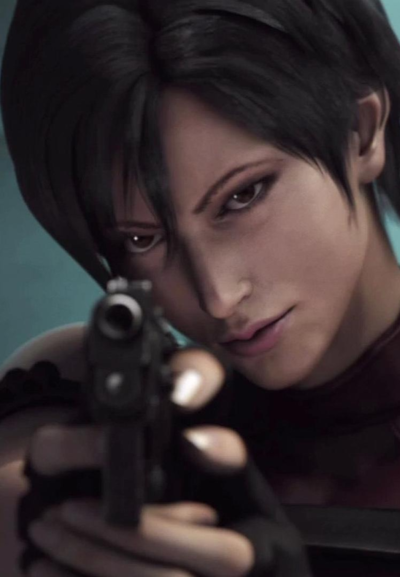 Included here largely for completeness, since the action heroine content likely would fall a little short of qualification on its own. Not that it’s entirely lacking, as the video at the bottom shows. But it’s definitely more a vehicle for Leon S. Kennedy (Mercer/Dorman). Which brings me to one of the odd things here: that is not a typo, it’s a double-credit for the character, because two different actors played the role, one providing the voice, the other the source for the motion-captured animation. Not sure I’ve seen that before.
Included here largely for completeness, since the action heroine content likely would fall a little short of qualification on its own. Not that it’s entirely lacking, as the video at the bottom shows. But it’s definitely more a vehicle for Leon S. Kennedy (Mercer/Dorman). Which brings me to one of the odd things here: that is not a typo, it’s a double-credit for the character, because two different actors played the role, one providing the voice, the other the source for the motion-captured animation. Not sure I’ve seen that before.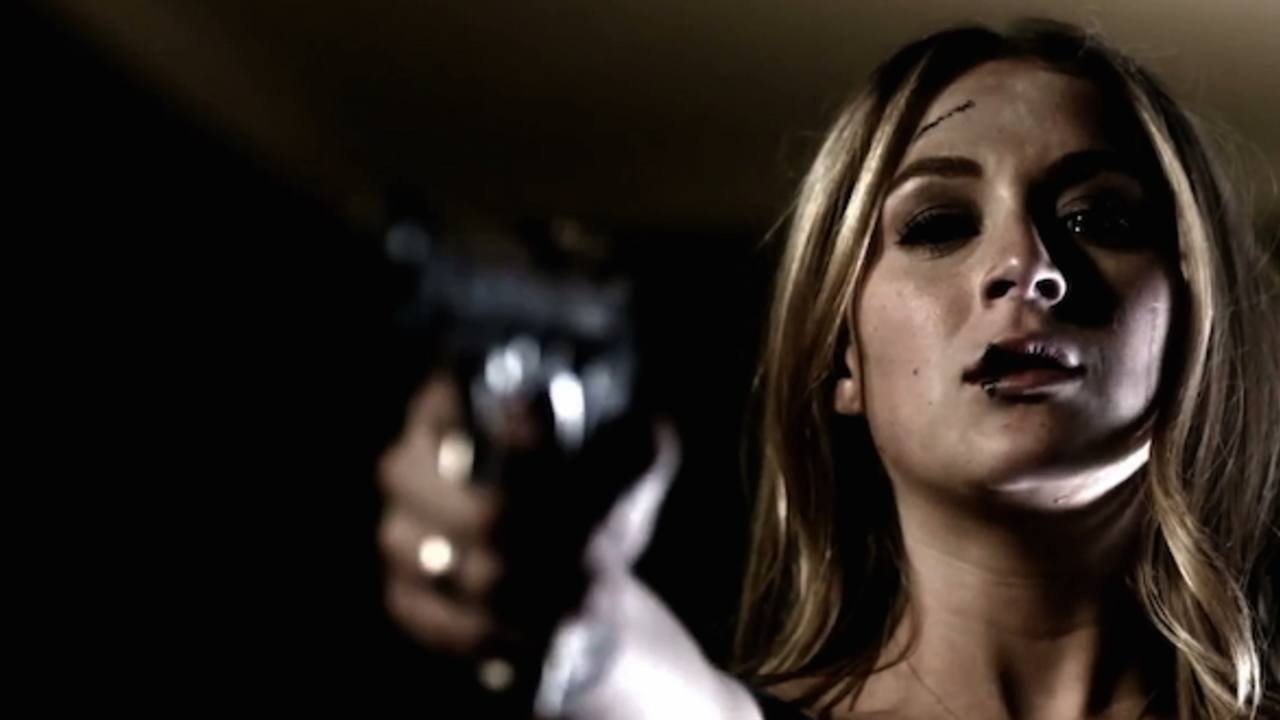 On the other hand, if the plot has more than some similarities, the tone and approach are different here. There’s much more in the way of social commentary here, with the disparate personas of the two young women. [Indeed, so disparate, you have to question how the heck they ever ended up sharing a house] Jamie (Vega) is serious-minded, the kind of person who labels her food in the fridge, and seeking to pursue an academic career, but desperately needs funds to cover tuition at her chosen college. Dee (Grammer) is a party girl, whose days are filled with going to the gym and tanning, while her nights are filled with tequila and casual sex.
On the other hand, if the plot has more than some similarities, the tone and approach are different here. There’s much more in the way of social commentary here, with the disparate personas of the two young women. [Indeed, so disparate, you have to question how the heck they ever ended up sharing a house] Jamie (Vega) is serious-minded, the kind of person who labels her food in the fridge, and seeking to pursue an academic career, but desperately needs funds to cover tuition at her chosen college. Dee (Grammer) is a party girl, whose days are filled with going to the gym and tanning, while her nights are filled with tequila and casual sex.




















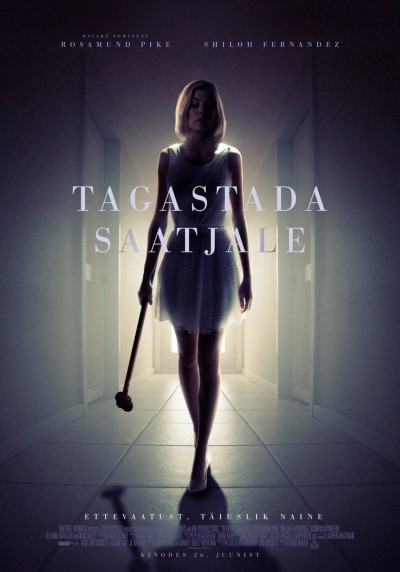


 There are occasionally times where our book reviewer Werner’s “split scale” of grades for both artistic merit and action, would come in handy. This is one of those times. For the action scenes here are as glorious as you would expect from the man behind Dead Fantasy, virtuoso symphonies of exquisite hyper-violence, meted out and absorbed by characters and monsters without fear or bias, in ways limited only – and not very much, at that – by the creator’s imagination. Probably inevitably, this overshadows a fairly perfunctory plot, and characters whose characterization is largely defined by the shade they wear. On a split scale, this would merit five stars for both the quantity and quality of action, but likely three or three and a half for artistic merit.
There are occasionally times where our book reviewer Werner’s “split scale” of grades for both artistic merit and action, would come in handy. This is one of those times. For the action scenes here are as glorious as you would expect from the man behind Dead Fantasy, virtuoso symphonies of exquisite hyper-violence, meted out and absorbed by characters and monsters without fear or bias, in ways limited only – and not very much, at that – by the creator’s imagination. Probably inevitably, this overshadows a fairly perfunctory plot, and characters whose characterization is largely defined by the shade they wear. On a split scale, this would merit five stars for both the quantity and quality of action, but likely three or three and a half for artistic merit.